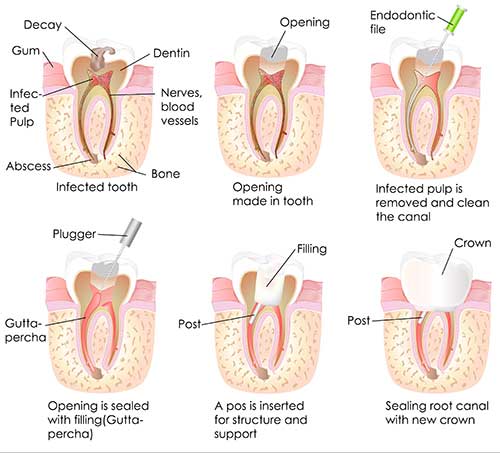Root Canal in Daejeon
Search and Compare the Best Clinics and Doctors at the Lowest Prices for Root Canal in Daejeon

Find the best clinics for Root Canal in Daejeon
No pricing info available
Vietnam offers the best prices Worldwide
Price: $ 1
From 1 verified reviews
HARRY CHO, 16 March 2019
This hospital is wonderful hospital! Staffs are kind. Doctors are proficient! Price is reasonable!
- Home
- South Korea
- Daejeon
WHY US?
At Medijump, we're making medical easy. You can search, compare, discuss, and book your medical all in one place. We open the door to the best medical providers worldwide, saving you time and energy along the way, and it's all for FREE, no hidden fees, and no price markups guaranteed. So what are you waiting for?

Free

Best Price

Widest Selection

Risk-Free
What you need to know about Root Canal in Daejeon

A root canal, also called endodontics, is a dental procedure to treat infection at the center of a tooth. It can repair or save a tooth that is infected or badly decayed instead of removing it. The term “root canal” comes from the act of cleaning the canal inside the tooth’s root.
What does a Root Canal Procedure Involve?
With dental advances and the help of local anesthetics, a root canal is not painful. During the procedure, your dentist removes the pulp and the nerve, then the bacteria are removed and the inside of the tooth is cleaned. The final step is sealing the inside of the tooth with a filling or crown.
How Long Should I Stay in Daejeon for a Root Canal Procedure?
A root canal is usually performed as an outpatient procedure, meaning you can leave the medical facility straight after the procedure. However, you need to stay in Daejeon for around 2 to 7 days, especially if your tooth has several roots that require more than 1 appointment.
What's the Recovery Time for Root Canal Procedures in Daejeon?
Your tooth may feel sensitive for a few days after a root canal. Over-the-counter painkillers will help you with any discomfort. You can go back to work and return to your normal routine the next day or as soon as you arrive in your home country.
What sort of Aftercare is Required for Root Canal Procedures in Daejeon?
After a root canal, you should avoid biting on hard foods for a few days. You also need to keep your teeth clean, limit sugary food, and give up smoking to avoid further root canal treatment.
What's the Success Rate of Root Canal Procedures in Daejeon?
The root canal procedure is almost always successful, with over 95% success rate. Many teeth fixed with this procedure can last for 10 years to a lifetime. The side effect of a root canal is tooth sensitivity, but this will subside within a few days. The risks include the loss of the tooth or abscess development on the tooth, but this is very rare.
Are there Alternatives to Root Canal Procedures in Daejeon?
If you are apprehensive about a root canal, your alternatives include tooth extraction and replacing it with a dental implant, bridge, or partial denture to restore your chewing function and prevent adjacent teeth from shifting.
What Should You Expect Before and After the Procedure
An infected or a badly decayed tooth is painful, and they can interfere with your life. After a root canal procedure, you will no longer feel any pain and you can enjoy your life again.
Whilst the information presented here has been accurately sourced and verified by a medical professional for its accuracy, it is still advised to consult with your doctor before pursuing a medical treatment at one of the listed medical providers
No Time?
Tell us what you're looking for and we'll reachout to the top clinics all at once
Enquire Now

Popular Procedures in Daejeon
Prices Start From $1

Prices Start From $1

Prices Start From $48

Prices Start From $1

Prices Start From $1

Prices Start From $11

Prices Start From $45

Recommended Medical Centers in Daejeon for Root Canal

- Interpreter services
- Translation service
- Religious facilities
- Medical records transfer
- Medical travel insurance
- Health insurance coordination
- TV in the room
- Safe in the room
- Phone in the room
- Private rooms for patients available

- Interpreter services
- Translation service
- Religious facilities
- Medical records transfer
- Medical travel insurance
- Health insurance coordination
- TV in the room
- Safe in the room
- Phone in the room
- Private rooms for patients available

- Interpreter services
- Translation service
- Religious facilities
- Medical records transfer
- Medical travel insurance
- Health insurance coordination
- TV in the room
- Safe in the room
- Phone in the room
- Private rooms for patients available

- Interpreter services
- Translation service
- Religious facilities
- Medical records transfer
- Medical travel insurance
- Health insurance coordination
- TV in the room
- Safe in the room
- Phone in the room
- Private rooms for patients available

- Interpreter services
- Translation service
- Religious facilities
- Medical records transfer
- Medical travel insurance
- Health insurance coordination
- TV in the room
- Safe in the room
- Phone in the room
- Private rooms for patients available

- Interpreter services
- Translation service
- Religious facilities
- Medical records transfer
- Medical travel insurance
- Health insurance coordination
- TV in the room
- Safe in the room
- Phone in the room
- Private rooms for patients available

- Interpreter services
- Translation service
- Religious facilities
- Medical records transfer
- Medical travel insurance
- Health insurance coordination
- TV in the room
- Safe in the room
- Phone in the room
- Private rooms for patients available

- Interpreter services
- Translation service
- Religious facilities
- Medical records transfer
- Medical travel insurance
- Health insurance coordination
- TV in the room
- Safe in the room
- Phone in the room
- Private rooms for patients available

- Interpreter services
- Translation service
- Religious facilities
- Medical records transfer
- Medical travel insurance
- Health insurance coordination
- TV in the room
- Safe in the room
- Phone in the room
- Private rooms for patients available

- Interpreter services
- Translation service
- Religious facilities
- Medical records transfer
- Medical travel insurance
- Health insurance coordination
- TV in the room
- Safe in the room
- Phone in the room
- Private rooms for patients available
Root Canal in and around Daejeon
About Daejeon
With a population of around 1.5 million people, Daejeon is the 5th largest city in South Korea. Due to its location in the center of Korea, it is a major transit hub for the region. It’s an important science and education center, with more than 200 research institutes located within its area. As South Korea’s medical tourism continues to flourish, Daejeon has undertaken strategic development to grow its medical tourism industry. The city is establishing its healthcare system by providing outstanding medical technology both in the private and public sector, improving its medical services, carrying out overseas marketing activities, as well as developing medical tourism products and medical tourism coordinators.
Popular Parts of Daejeon
The most popular part of Daejeon is Yuseong-gu, the administrative district in the northwest part of the city. It is home to Yuseong hot springs resort town, where visitors can find a hot spring that can counter many types of illnesses. The hot spring contains alkaline minerals, such as sulfur, calcium, potassium, silicic acid, and radium. An especially high concentration of radium is found in the hot spring, which is known to be good for neuralgia and geriatric diseases. Around the area of Yuseong hot springs resort town are upscale shopping areas, accommodation, as well as numerous cultural centers and sightseeing places. Another popular area is Dunsan, the city’s central business district filled with shops and restaurants. Besides these two areas, there several popular places for sightseers, including the mountains Sikjangsan and Jangtaesan, the lake Daecheonghosu, Expo Science Park, and Daejeon O-World.
Transport in Daejeon
The international airport serving Daejeon is the Cheongju International Airport, which is located in Cheongwon-gu. It has several flights to and from cities in Asia. However, most international tourists arrive at Incheon International Airport and travel to the city with a shuttle bus from the airport or a KTX express train from Seoul. The most convenient and affordable way to get around Daejeon is by inner-city bus and the subway. Visitors can buy T-money travel cards to reduce the fares of the bus and subway. Taxis are available, but make sure to avoid unregistered taxis.
Visas in Daejeon
Holders of passports from 112 countries, including the EU, the US, and Russia, can visit Daejeon without a visa for 30, 60, and 180 days. Citizens of other countries not listed in the visa-free entry should apply and obtain a visa prior to their visit.
Weather in Daejeon
There are four seasons in Daejeon. Summer, starting from June to August, is typically hot and rainy. From September to late November is autumn, which has pleasant weather. Winter, from late November to March, can be freezing. The temperature will slowly rise in spring, but rainfall is more common.
Additional Info
- Local Currency: The official currency in Daejeon is South Korean Won (KRW). 1 USD is approx. 1,185 KRW.
- Money & Payments: ATMs accepting international cards are widely available. Credit cards are accepted at many restaurants, hotels, and shops. Tipping is not expected and can be considered rude in restaurants. However, it is okay to tip guides and porters.
- Local Language: Korean is the official language, with Hangul as the formal script. English is mostly spoken in tourist areas.
- Local Culture and Religion: Around 47% of the population is not religious or follows indigenous religions. Buddhism and Christianity are freely practiced.
- Public Holidays: New Year’s Day, Independence Day, and the Birthday of Buddha are some of the important public holidays in Daejeon.
Popular Searches
- Plastic Surgery in Thailand
- Dental Implants in Thailand
- Hair Transplant in Thailand
- Breast Augmentation Thailand
- Gastric Sleeve in Thailand
- Gender Reassignment Surgery in Thailand
- Laser Hair Removal in Bangkok
- Botox in Bangkok
- Dermatology in Bangkok
- Breast Augmentation in Bangkok
- Coolsculpting in Bangkok
- Veneers in Turkey
- Hair Transplant in Turkey
- Rhinoplasty in Turkey
- Stem Cell Therapy in Mexico
- Rhinoplasty in Mexico
- Liposuction in Mexico
- Coolsculpting in Tijuana
- Rhinoplasty in Korea
- Scar Removal in Korea
- Gastric Sleeve in Turkey
- Bone Marrow Transplant in India
- Invisalign in Malaysia
- Plastic Surgery in the Dominican Republic
- Tummy Tuck in the Dominican Republic
- Plastic and Cosmetic Surgery in Poland
- Rhinoplasty in Poland
- Hair Implant in Poland
- Dental Implants in Poland
- IVF in Turkey
